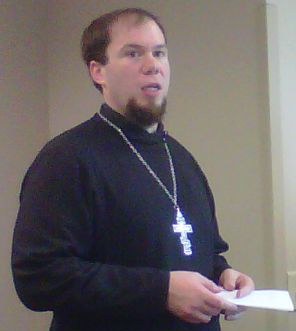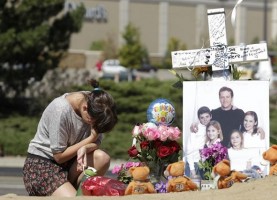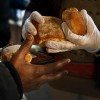 We have all learned of the tragedy befalling a crowd gathered to watch the most recent Batman movie at midnight on July 20, 2012. James Eagan Holmes (allegedly) walked into the theatre and shot 70 people, injuring 58 and killing 12. In the short time since then, many people in the media, in personal blogs, in tweets, and on Facebook have offered their reactions and arm-chair theories and diagnoses. In the midst of such responses, it may seem odd to add just one more. I am willing to take this risk in the hopes that what I have to say here will prove helpful to the larger conversation. Should this not prove to be the case, then I ask your forgiveness, for I am not intending to write something just for the sake of “jumping in.”
We have all learned of the tragedy befalling a crowd gathered to watch the most recent Batman movie at midnight on July 20, 2012. James Eagan Holmes (allegedly) walked into the theatre and shot 70 people, injuring 58 and killing 12. In the short time since then, many people in the media, in personal blogs, in tweets, and on Facebook have offered their reactions and arm-chair theories and diagnoses. In the midst of such responses, it may seem odd to add just one more. I am willing to take this risk in the hopes that what I have to say here will prove helpful to the larger conversation. Should this not prove to be the case, then I ask your forgiveness, for I am not intending to write something just for the sake of “jumping in.”
There are several angles I could take but will not. I am not going to speak about how this should change gun laws. To be perfectly blunt, I’m not convinced we could write legislation that would truly prevent such an event from occurring. This is not to say reasoned discourse concerning guns should not occur, but one must remember that many similar events do not include assault rifles, but simply guns used for other things, such as competitive target shooting and hunting. Take away the guns and one is still left with easily built bombs. We cannot legislate these tragedies into non-existence. Nor am I going to claim to feel the victims’ pain. I do not. They know it. I know it. We should all know it. No one would benefit from me lying to the contrary. Nor am I going to speculate on what is “wrong” with Mr. Holmes. Indeed, I hope we can all resist this temptation, and I’m sure it is quite a temptation to claim he’s mentally ill, possessed by a demon, was abused and/or bullied, and/or was a “loner.” We will learn more about him as his court hearings proceed.
Rather, what I wish to address is “asking why.” When horrific events happen, it is natural to ask why. We all want to have some “reason” upon which we can hang our experiences. This is a natural reaction, whether it comes immediately or later. Our Orthodox Christian Tradition offers us at least three ways in which to respond to this question when we find ourselves asking it: there is a larger, cosmic reason; ultimately, the question “who” is more important; and introducing the answer to “who” is what is ultimately needed.
The larger, cosmic reason is easy enough for us to remember. We have a God who created everything in freedom and love. Our God loves us and respects us not as robots or puppets, but as relatively free agents and persons. This is why he created angels and humans with the freedom to choose and establish their own relationships (with each other and with God). Satan wanted what God had, to the point of envy and embitterment. He influenced our ancestors, who likewise distorted their relationship with God (and with each other). Evil, the lack of good, now runs rampant throughout humanity. There are exceptions, of course. Elijah and Enoch were taken into heaven without dying first. Mary (the Mother of God) died in holiness, having lived a life of purity beyond what even Elijah and Enoch could live and her body was taken into heaven. Most of us, however, commit numerous minor sins throughout our lives, from foul language, to little lies, to mild bouts of anger. Some of us commit larger sins as well such as committing fornication and becoming drunk. Some of us commit larger sins still, such as drinking and driving, committing adultery, and being verbally or physically abusive. Some go even farther. Given such a preponderance of sin within the world, it becomes easy for each generation to sin. Therefore, we each are guilty to contributing to the larger morass of sin within the world, including the larger sins that we find so horrific. The fall committed by our ancestors is not simply something in the past, but is a reality we each live out on a daily basis in our own individual ways. So, if we want to know “why,” there’s our cosmic answer.
Of course, when we ask “why,” we often are seeking to know not the cosmic answer, but an answer narrowed down to our particular point in space and time. When we find ourselves desiring this answer, however, we should remember that what we are to do as Orthodox Christians is apply God’s larger, cosmic answer to the problem of evil in our own lives. That answer is Jesus the Christ crucified and risen. In response to the cosmic problem of evil, God the Son became incarnate in the person Jesus, becoming fully human and suffering and dying in order to get the medicine of divine immortality to the deepest part of the human wound. His rising offered healing to that very wound. It is a cosmic answer to the problem of why is there evil. Yet, it is also an answer intended to be brought into each of our own lives. Each of us are called to be baptized into Christ, into his death and resurrection. Each of us are called to pray to him, to lay our burdens upon him. The “good news,” the Gospel, is that healing is offered to each and every one of us and that ultimately, sin, death, and the devil do not have the last word.
It is this “who,” this Jesus, that we are to share with all those around us because this “who” is what is needed when times are difficult. Let me share a personal story with each of you. When I was barely 14 years old, I received my driving permit, which allowed me to drive during the day or at night with my parents present. Following a celebration for my paternal grandparents’ wedding anniversary, my dad handed me the keys and asked me to drive us home. It was dark and it was raining heavily. I had never driven in those circumstances before, but I was also glad to have my dad’s confidence and support. I barely made it out of the parking lot. The restaurant was located next to a four lane highway and while trying to cross that highway, I misjudged the traffic and we were “T-boned.” The driver of the other car was OK. My mom was barely coherent and my father’s knee and neck were severely injured. In the emergency room, they initially had difficulty finding the location of my mom’s internal bleeding and both my dad and I thought she was going to die. My dad was ultimately airlifted to another hospital in order to have neck surgery and prevent paralysis. Needless to say, I felt terribly guilty. Yet, in the days that followed, it did not comfort me to know the various factors that could answer “why”: it was dark, it was raining, I was inexperienced, the other car was northbound at a normal speed, and the tires spun slightly in the water as I accelerated. That is “why.” You could have told me those things a thousand times over and it would not have helped me heal. What did help me heal was finally realizing that I was not “guilty” even while being “responsible,” and that this could be realized by acknowledging that God still loved me, that in the larger cosmic scheme of things, Jesus’ love for me did not waver. Furthermore, God desired that I lay my feelings of guilt and shame upon him.
Again, none of this means I can “feel the pain” of victims of tragedies, whether in Aurora or elsewhere. What it does mean is that in the midst of pain, what is needed is not the answer to “why” at the micro, the personal, level. That is so whether we seek an assessment of the facts surrounding an accident or the analysis of the mental health of an assassin. What is needed is a declaration of “who”—the answer to Jesus’ question to Peter: “Who do you say that I am?” If we answer with the Orthodox confession, as Peter did, we have our answer to our pain. “You are the Christ, the Son of the Living God.” Our God does live. Our God is Life. Our God heals us through his son Jesus the Christ. Knowing who it is who took on pain and death and tragedy and knowing that we can each, personally, fall upon his shoulders is healing. The “why” of the larger, cosmic perspective, provides us a “who” at the micro, personal level.
That is precisely what our American society needs. Gun laws won’t stop this any more than illegalizing drugs has prevented people from overdosing and killing family relationships and committing gang violence. Asking to see detailed psychological evaluations of criminals and their parents will not heal victims of serious tragedies. Those are all attempts to address symptoms, symptoms of the larger cosmic fall down into which we’ve all begun spiraling. What we need to do is to experience healing by Christ in our own lives and to share this with others. If we really, truly care about Aurora, we will start by placing our pains before God in prayer. We will start by sharing the Gospel with those around us. We will start by attending services with more frequency so that we may gather in Thanksgiving with our fellow Orthodox Christians. We will love those around as Christ loves them. We will not hold back, but will tithe to the Church. We will support the ministry work that so many have struggled to establish within America, such as IOCC, OCMC, and FOCUS, not to mention the myriad local Orthodox ministries, our seminaries, schools, and retirement programs and monasteries. In short, we will strive to become a burning sword of God, cutting through the despair and indifference found all too readily not only withinAmerica, but within our very own Church. Words on a blog, including these words here, on a Facebook page, or in a tweet or sermon are easily written. Actions that involve relying on Christ to heal our pain and to extend that healing presence to the world are difficult, but tragic wounds require intense medications.
Fr. Oliver Herbel, rector of Holy Resurrection Orthodox Mission Church in Fargo, North Dakota.

















